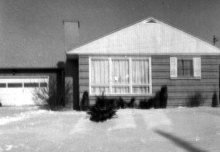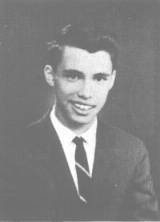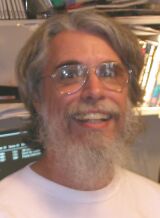
Autumn, 1964. After making a circuitous trip to see family members in other states we left New Hartford for Alexandria, Virginia. We got an efficiency in the Presidential Gardens. Dad had to have briefings at the State Department so we stayed there at least six weeks. I went to the George Washington Middle School. The only time I had lived in such an urban area was three years before in Honolulu. I enjoyed going up and down the wide streets, checking out the businesses and all.
I was interested in playing the guitar so I used to look in the window of the music shop on the main street near our apartment. I noticed a sign indicating that guitar lessons were offered. I was thinking about asking my dad if he would pay for some lessons, that is, until the day I actually entered the store. I had just begun to strike up a conversation with the girl who worked there in the afternoon. She was just a little older than me, probably the owner/instructor's daughter. She said they offered guitar lessons and I could have one right then if I wanted. But as she spoke I noticed the owner drunk behind the counter just then so I said I would think about it, but I didn't.
I don't remember the names of any of my schoolmates in Alexandria; I do remember some names of church kids in Falls Church where we went to church. There was a man I first saw there who I got to know later in my adulthood—Bob Kendrick. He was really from Nashville but he was a federal judge, I believe, and he was working up there. I got to know him at Belmont Church in Nashville in the '70s and still see him around town now and then.
The Falls Church, VA church of Christ was the biggest church I had ever attented. I think I felt a bit engulfed after being in the small "mission attitude" churches of the farther north. I remember a church youth trip to the Great Falls of the Potomac, which was pretty memorable. The only other notable thing I remember was that the preacher's name was Bonds Stocks—a memorable name, almost as memorable as the name of a man, Wash Shouse, I knew years later. Oh yes, I also remember the song leader in that big church had a notable practice as he came to the end of each chorus of a hymn. He would ritard the last few words so that I thought he was trying to sound like Perry Como or some other crooner. I didn't think it was appropriate.
I don't remember much about leaving for Pakistan except that we met Mr. Hallmark from Rome, NY in the DC airport. Ever since then I have always kept a sharp eye out when I go to airports. There is rarely a time I visit the airport that I don't see someone I know. We went on Pan American and stopped at several airports on the way. Also we visited my aunt Isabella and her family in Kaiserslautern. My cousins showed me around the army base, etc. Also I remember seeing the largest beer barrel in the world on that trip. That was in Heidelberg. That was the first time I was ever in Europe and also the last although we sometimes dream of going.
After landing in Karachi we couldn't get a connecting flight so we had to spend the night in the US government guesthouse. It was a nice place but once again I met a person under the influence. A man put out his hand to shake mine when introduced to me but he couldn't seem to muster the hand/eye coordination to actually cause his hand to meet mine. I stood there with my hand out while he waved his around. He was half-drunk. I didn't appreciate it.
When we arrived in Lahore, our new city, we went to the Corrs' house and benefitted from their hospitality for a few days until our house was ready. I can still remember the smells of late summer in the Punjab combined with the pungency of the fresh oil paint in the "bungalow" that had been rented for us by my dad's employer, the Agency for International Development (AID). In India and Pakistan a bungalow is not a small house as it is in the US but a large house. It was a sweeping one-story, sort-of prairie style house. It was stuccoed solid brick with cantilevered portico roofs jutting out over the front and side door areas. It had a solid brick roof with an outside stairway to go up. I used to take my guitar and go up there to practice. I could strum as loud as I wanted up there and no one would bother me.
We had servants in our house in Pakistan. With the exchange rate and the standard of living and the fact that the houses had servants' quarters in them, Americans were expected to have servants. If I remember rightly our cook met us at the door when we arrived at the house for the first time. He had worked for another family who had left and he was ready to show us the ropes. He was a good man, named Ali Asghar. He once told my mom that he didn't have the heart to spank his kids; his wife did it instead. My parents liked and respected him so much they paid for reading lessons for him for a time before we left Pakistan.

At the American school in Lahore I blended into an international society for the first time in my life. Most of the American and European kids in town went to our school. Martin Scotland was my best friend. He was from Germany. There were kids from Holland, Sweden, Ireland, as well as Pakistani kids in our school. The faculty was international also. My Spanish teacher, Mrs. Pilar Malik, was a Spaniard who had married into a Pakistani family. She taught us to speak as if we were natives of her home province.
We found there was a church that met on Siddiqi Street off Ferozepur Road near the stadium. Brother Ghulam Masih was the preacher. His sons were my friends: Eric, Clifford, Peter, George. Clifford was my pal and, being a year or two older, he functioned as a mentor to me on occasion. Once we made arrangements for him to instruct me in the finer points of boxing. As it turned out, one boxing lesson was enough to last me a while.
The Masihs were all musical, skilled not only in singing and harmony but in playing various and sundry musical instruments. I remember the little portable pump organ called the harmonium. Eric would pump the little bellows with one hand and play the keyboard with the other hand. They played harmonicas and concertinas among other things. When we visited in their home we always got a concert. Eventually I sold the little Sears Roebuck guitar I brought with me to Clifford after my dad got me another one. I included guitar lessons in the sales price. Cliff was my first guitar student—and an attentive one too. Later, after we left the country he gave the guitar to his little brother George who, I understand, was able to make a few rupees playing guitar for film scores recording and such. Clifford emigrated later and lives in Nashville now with his wife Donna.
Some of the interests I followed while we lived in Pakistan were guitar playing, languages, reading Agatha Christie, and socializing with girls. Most of my friends were Americans and Europeans, though I also numbered among my friends some fine Pakistani Christians. Then there were Mansour and Abrar, two young adult men who liked to hang out with my family. Abrar was one of those "I'm not a very good Moslem" types. He ate bacon with us at Saturday morning breakfast. He was always full of wonder at everything new he learned. Once, when our family went on a day-outing to a national forest, Abrar wrangled an invite and brought along a brown-haired Swedish girl who was traveling the world. He had met her while he was hanging around the local youth hostel. Abrar was beside himself. He got a free holiday, a picnic and—with a free-spirited European girl to boot.
Now I must tell the story of another friend I made in Pakistan. One day the phone rang, soon after we had got the phone. Dad answered and, after a couple of minutes, called me to the phone. The fellow said his name was Parvez Masood. He was about the same age as I was and said he wanted to have an American friend. He made conversation by asking, "Tell me something about yourself." We talked for a while; it was kind of a taxing experience, stressful. I wanted to be polite but it is not easy to talk to someone who keeps asking, "Tell me something about yourself." Well, he kept calling, regularly, every few days. Finally, we had talked enough times on the phone and we said we would meet to do some activity or something. After mulling that over during several phone calls we agreed we would meet at his house. Then he told me something that I had no file in my mental filing system in which to file it. He told me his name was not really Parvez Masood. His name was Saliq Masjid. I was really taken aback. Parvez Masood not his real name? Why would he give me a false name? The answer was that he had tried to make friends with some Americans before and they had said bad things about him behind his back so he wanted to be really cautious until he knew he could trust me. Well, he could trust me and we did meet. He had a mo-ped; I think we went to play tennis, I don't remember precisely. His dad was a high government official and had a big house, bigger than our house. I'm sure I would have gotten to known Saliq better if I hadn't gone back to the states soon after that. Now I am going to show you that he had every reason to trust me: Saliq Masjid is not his real name either. I'm not going to tell his real name. For all I know he is a high government official in Pakistan today and I wouldn't want to embarrass him. And I sure wouldn't want him to be disappointed in me.
Another thing I used to do in Pakistan that I forgot to mention was bicycling. I didn't have a racing bike; I had a Sohrab model 28-inch bike. A Britisher would have called it a "sit up and beg"—the kind with the straight handlebars and connecting rods for the brakes instead of cables. Those work bikes they made in many different countries were a real wonder. There must be millions of them worldwide. They last almost forever; they are easy to fix if something should go wrong, which it rarely did anyway. They were heavy with no changing gears, just one speed but you didn't really need to shift gears as there weren't many hills in the Punjab— it was a flat plain. They had a rear carrier on them; a man could transport a young family of five on one of those bikes. The man on the seat, his two oldest kids sitting on the cross bar with his wife on the back carrier holding the baby.
I used to reckon myself a fast cyclist and liked to use my energy. Riding down the Mall Road towards downtown, I used to pass all the bike riders—men going to or coming from work. Well, now and then a fellow would take my passing as a challenge to a race. They would come out of the bike lane and give me a good run. One morning I was out riding, training, as I called it. A fellow with the most beat-up old bike and with his ten year old son on the back carrier challenged me . . . and took off like greased lightning. . . I never caught him. I couldn't believe it.
There are lots of other things I could remember about the life of an American teen overseas but they are flooding in a little too fast to write them down right now. I wasn't much in tune with spiritual life during that time; I was primarily concerned with fitting into the teenage expatriate culture while attempting to satisfy my conscience also.
While we were in Pakistan there was a border war with India that was very close to us. The war was so hot that the American dependents were evacuated—to Teheran. My experience in Teheran was a whole 'nother story, as we say. I'll tell that another time. We did get to take a tour of the holy land at Christmas-time, 1965. When we went back to Lahore a lot of my friends didn't get to come back and I missed them. Then a girl one year older than I who I had a crush on went back for college and I was even more depressed. I asked my dad to let me go back to the states and stay with my grandparents for my senior year. He didn't want me to go but I convinced him and he let me. Well, my grandparents were good to me, but I missed my family more than I thought I ever could. When they came back in the early spring I was happy, even though it would mean changing schools again. I went to six different school during my four years of high school. I graduated in Herndon, Virginia as dad had been assigned to work in Washington for the next few years.
After graduation I got to go to Camp Hunt again, this time as a counselor. I would feel at home again after missing two years. It felt like a longer time than that.

